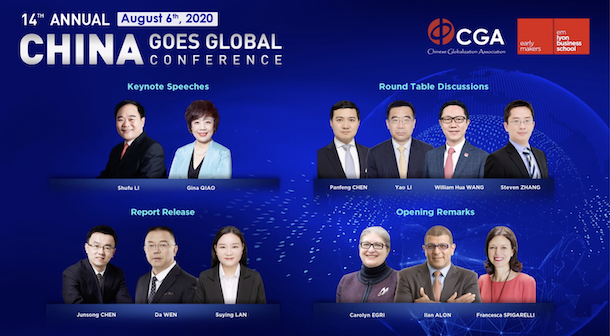
Photo/Screenshot
Aug. 7 (NBD) -- The massive shock of the coronavirus pandemic has significantly affected global economy, and international demand has plummeted accordingly. This poses a great challenge to economic globalization.
To explore efficient ways for global development of Chinese enterprises in the post-pandemic era, the Chinese Globalization Association and emlyon business school held the 14th Annual China Goes Global Conference on August 6, bringing together worldwide business leaders and experts to discuss the successful experience of Chinese enterprises in going global and guide the companies' steady development in overseas markets.
At the conference, emlyon business school and National Business Daily (NBD) also jointly released a report highlighting contributions that Chinese firms make to countries along the Belt and Road.
Innovation, mutual integration matter
The spread of coronavirus has made a huge and immediate impact on the global economy, largely hampering the international trade and disrupting the global supply chain.
Slowing globalization hit industries very hard, such as automobiles and electronics. Approaches to deal with the complex situation properly thus become extremely significant to Chinese companies seeking for overseas expansion.

Li Shufu, Chairman of Zhejiang Geely Holding Group (Photo/VCG)
In the eyes of Mr. Li Shufu, Chairman of Zhejiang Geely Holding Group, 2020 is a year that is important and difficult for global economic integration, especially with the coronavirus pandemic, and the global pattern will change dramatically, which is a challenge facing every enterprise dedicated to global development.
The car industry, which is a global one, should be more open, but when the global economy encounters difficulties, it should have the capacity to guarantee the local supply of auto parts, especially the core components and raw materials, which would require a lot of efforts in R&D, Mr. Li said in a keynote speech at the conference.
To compete globally, Chinese automakers should, on one hand, ensure regulatory compliance, and on the other hand, strengthen capabilities in innovation, engineering and design and master core technologies, or they would never have a say and win respect in the global market, Mr. Li underscored, citing Geely's ten-year experience in globalization after the acquisition of Volvo Cars. Moreover, he emphasized the importance of mutual integration in multinational operation.
According to Ms. Gina Qiao, Senior Vice President of Lenovo, businesses reeling from the pandemic should retool their supply chains to avoid the over-reliance on suppliers from a single country. Every enterprise should be committed to creating a more flexible and more resilient global supply chain to enhance its market competitiveness and risk prevention capacity, she added.

Gina Qiao, Senior Vice President of Lenovo (Photo/Screenshot)
In the face of economic uncertainties, Ms. Qiao stressed that Lenovo itself is managing to mix globalization with localization, namely, global sourcing and local delivering. In her opinion, businesses should pay more attention to local operations while integrating global resources into product R&D, production, supply, distribution and services to provide optimal product and service experiences for consumers around the globe.
Report highlights contributions of Chinese firms to B&R countries
During the conference, emlyon business school and NBD together released a report entitled "Top 100 Chinese Companies by Contributions to Belt & Road Initiative Host Countries".
Part of research achievements of the Good Business Project launched by the two parties in 2016 to explore subjects like sustainable development and economic globalization, the report highlights an assessment system and model with a focus on the contribution of Chinese companies to investment recipient countries along the Belt and Road route, Wen Da, Chairman of NBD, said at the conference.
Four indexes - return on foreign investment, ESG (environmental, social and governance), increase of corporate value, and investment value in investment recipient countries - are set forth to measure the contributions, which provide reference to the global development of Chinese enterprises.
According to the report, global development is not simply about mergers and acquisitions. Countries and regions along the Belt and Road route are different in economic development, political system, and social and cultural practices, and Chinese enterprises shall comply with local practices while seeking for expansion and growth in those countries and regions. The inclusion of the ESG index is helpful to improve companies' performances and reduce investment risks, which from a long run will promote the green investment along the route.
The second volume of the report series is currently in the works, and places an emphasis on the relationship between corporate social responsibility and globalization development in the context of epidemic, Mr. Wen revealed.
Apart from the report release, a roundtable dialogue was held to discuss topics like trends of supply chain changes, dynamics in macro economy, intercultural communication, and globalization of Chinese enterprises.
Email: gaohan@nbd.com.cn


 川公网安备 51019002001991号
川公网安备 51019002001991号





